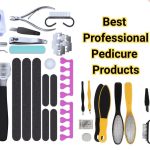As an Amazon Associate I earn from qualifying purchases.
Dealing with an ingrown toenail can be a real pain, both literally and figuratively. You might wonder if your local nail salon can offer some relief.
After all, they are experts in nail care, right? Before you book that appointment, let’s explore what a nail salon can and can’t do for your troublesome toenail. Understanding the options and potential outcomes can save you time, money, and discomfort.
Stick around as we dive into whether a nail salon is your best bet for fixing an ingrown toenail or if you should consider other solutions. Your feet will thank you for it.
Ingrown Toenail Basics
Nail salons often provide basic pedicure services but lack expertise in treating ingrown toenails. Professional podiatrists excel in proper care, ensuring safe removal and healing. Seeking specialized help avoids complications and promotes healthy nail growth.
Ingrown Toenail Basics Have you ever felt that sharp pain in your toe that makes walking a dreaded activity? You might be dealing with an ingrown toenail. Understanding the basics of ingrown toenails can help you decide whether a trip to the nail salon or a doctor’s office is in order. Painful and sometimes unsightly, an ingrown toenail occurs when the edge of your toenail grows into the surrounding skin. It’s a common issue that many people experience at some point. But what causes this pesky problem, and how can you spot it early?
Causes Of Ingrown Toenails
Several factors can lead to an ingrown toenail. Wearing shoes that are too tight is a major culprit. They push your toenails into the skin, causing irritation. Improper nail trimming is another cause. Cutting your nails too short or rounding the edges encourages the nail to grow into the skin. In some cases, the natural shape of your toenail can predispose you to ingrown nails. If your toenails naturally curve, you may need to be more vigilant.
Common Symptoms
Identifying symptoms early can save you from a lot of discomfort. Redness and swelling around the nail are typical signs. You might also notice tenderness or pain in the affected area. If the nail has started to grow into the skin, you could experience increased pain and possibly infection. Any drainage or pus could indicate that an infection has set in. Ignoring these symptoms can lead to more serious complications. So, it’s crucial to address the problem as soon as you notice it.
Potential Complications
Leaving an ingrown toenail untreated can lead to several complications. Infection is the most common issue, which can escalate if ignored. Severe infections might require antibiotics or even surgery. For those with diabetes or circulation issues, an untreated ingrown toenail can pose even greater risks. It may affect your overall foot health, leading to more serious conditions. You might wonder, can a nail salon fix an ingrown toenail effectively? While some might offer temporary relief, it’s essential to know when to seek medical advice. Your health should always be your top priority.
Role Of Nail Salons
Nail salons have long been the go-to destination for pampering and aesthetic nail care. But when it comes to addressing medical issues like ingrown toenails, their role becomes more nuanced. These establishments can offer relief and guidance, but it’s essential to understand their limitations and know when to seek further help.
Services Offered
Nail salons provide a range of services that can assist with minor ingrown toenail issues. Trained technicians can carefully trim and shape your nails to prevent further growth into the skin. They may offer soothing foot soaks to reduce swelling and discomfort.
Some salons use specialized tools to gently lift the nail edge. This can offer temporary relief and help guide the nail to grow correctly. Regular salon visits can maintain nail health and prevent future problems.
Limitations In Treatment
Despite their expertise, nail salons have limitations. They can manage minor cases but are not equipped to handle severe infections or chronic ingrown toenails. While they can provide immediate relief, they cannot offer long-term medical solutions.
It’s crucial to recognize when a salon’s services are no longer sufficient. Persistent pain, swelling, or pus indicates a need for professional medical care. Nail technicians are not trained to diagnose or treat complex nail conditions.
When To Seek Professional Help
There are times when you must consult a podiatrist or healthcare provider. If home remedies or salon treatments don’t work, it’s a sign to seek medical advice. A professional can prescribe antibiotics or perform minor surgeries if needed.
Ask yourself—how severe is the pain? Can you walk comfortably? If the answers are concerning, don’t delay in seeking expert help. Prioritizing your health over aesthetics can prevent complications.
As you navigate the world of nail care, remember that salons can be a part of your journey, but knowing their role is vital. Have you ever had an ingrown toenail treated at a salon? Share your experiences below!
Professional Medical Treatments
Ingrown toenails can cause discomfort and pain. Nail salons might offer temporary relief, but professional medical treatments provide lasting solutions. Experts employ advanced methods to treat stubborn ingrown nails.
Podiatrist Interventions
Podiatrists specialize in foot care. They assess the severity of ingrown toenails. They use precise techniques to treat the affected area. This might involve removing part of the nail. They ensure the nail grows correctly. Podiatrists also advise on proper foot care. Their expertise prevents recurrence.
Surgical Options
Surgery can be necessary for severe cases. It involves removing part of the nail. Sometimes, the nail bed is treated to prevent regrowth. This method is effective for chronic issues. Patients usually experience quick recovery. Pain relief is significant post-surgery. Surgeons ensure the procedure is safe.
Non-surgical Treatments
Non-surgical treatments are available. These include soaking the foot. Antibiotic ointments can reduce infection risk. Specialists might suggest wearing open-toed shoes. This minimizes pressure on the nail. Regular cleaning prevents worsening. Non-surgical methods are best for mild conditions.

Credit: www.drnickcampi.com
At-home Care Tips
Dealing with an ingrown toenail can be uncomfortable. While visiting a nail salon might offer relief, understanding at-home care is crucial. These tips can help manage minor cases effectively. Simple, consistent practices can prevent pain and infection.
Proper Nail Trimming Techniques
Trim nails straight across. Avoid rounding the edges. This reduces the risk of nails growing into the skin. Use clean, sharp nail clippers. Cutting nails too short can cause problems. Leave a bit of length to protect the toe.
Home Remedies
Soak your foot in warm water. This softens the nail and skin. Add Epsom salt for extra relief. It reduces swelling and pain. Use cotton under the nail edge. Lift the nail gently to encourage proper growth. Apply antibiotic ointment. This prevents infection and aids healing.
Preventive Measures
Wear comfortable shoes. Ensure they are not too tight or narrow. Tight shoes can press nails into the skin. Choose breathable socks. They keep feet dry and reduce irritation. Check your feet regularly. Early detection helps manage potential issues.
Expert Opinions
Understanding whether a nail salon can fix an ingrown toenail requires expert opinions. Podiatrists and nail technicians offer unique insights into this common issue. Their perspectives help in understanding the right approach for treatment. Let’s dive into what the experts have to say.
Insights From Podiatrists
Podiatrists are medical specialists for feet. They often treat ingrown toenails. According to them, ingrown toenails can lead to infections if not treated properly. They suggest professional medical intervention for severe cases. A podiatrist might recommend procedures to prevent future occurrences. In their view, nail salons can help only with mild cases. For pain or swelling, a doctor’s visit is best.
Perspectives From Nail Technicians
Nail technicians work with nails daily. They have experience handling minor ingrown toenails. Many believe they can manage them before they worsen. Their focus is on prevention and maintenance. Regular pedicures might help avoid ingrown toenails. Nail technicians stress the importance of proper nail cutting. They often advise clients to seek medical help if there’s pain or infection. Their role is more supportive than curative.

Credit: www.youtube.com
Making The Right Choice
Choosing the right place for ingrown toenail care is crucial. A nail salon might offer basic relief, but professional medical treatment ensures proper healing and prevents complications. Consider expert care for health and peace of mind.
Making the Right Choice Deciding how to handle an ingrown toenail can be tricky. You might wonder if a nail salon can offer a quick fix or if a doctor’s intervention is necessary. Understanding the best course of action for your specific situation is crucial, not only for immediate relief but also for your long-term foot health. Let’s dive into the factors to consider when making this important choice.
Evaluating The Severity
First, take a close look at the condition of your toenail. Is there redness, swelling, or pain that doesn’t go away? If you notice any pus or severe discomfort, it’s time to seek professional help. Mild cases might only require a salon’s gentle touch, but severe symptoms need medical attention. Remember, your comfort and safety should always be the priority.
Choosing Between Salon And Doctor
Do you go for the relaxing environment of a salon or the clinical expertise of a doctor? Nail salons can offer basic treatments for minor ingrown nails, such as trimming and soothing ointments. However, if the issue persists, a doctor can provide advanced solutions like surgical removal or antibiotics. Consider your past experiences and trust your instincts. If a friend once had success at a salon, it might be worth a try, but don’t hesitate to consult a doctor if you’re unsure.
Long-term Care Strategies
Once you’ve dealt with the immediate issue, think about preventing future ingrown toenails. Proper nail cutting techniques are essential—avoid cutting too short or rounding the edges. Choose comfortable shoes that give your toes room to breathe. Keep your feet clean and moisturized. These simple actions can save you from recurring pain and visits to the salon or doctor. Are you taking the right steps to care for your feet? Your choices today will impact your comfort tomorrow. Engage with your own experiences and explore what works best for you. The path to healthy feet is often clearer than you think.

Credit: www.drnickcampi.com
Frequently Asked Questions
Can Nail Salons Treat Ingrown Toenails?
Most nail salons can manage minor cases of ingrown toenails. They offer basic trimming and cleaning services. Severe cases should be handled by a podiatrist to avoid infections.
Do Nail Technicians Remove Ingrown Toenails?
Nail technicians typically do not remove ingrown toenails. They can provide relief by trimming nails correctly. For persistent issues, a podiatrist’s expertise is recommended.
Are Pedicures Safe For Ingrown Toenails?
Pedicures can be safe for mild ingrown toenails. Ensure the salon uses sterilized tools and follows hygienic practices. Severe cases should be treated medically.
How Do Salons Handle Ingrown Toenails?
Salons usually trim and clean ingrown toenails carefully. They may offer advice on nail care. For severe pain or infection, consult a healthcare professional.
Conclusion
Deciding on where to treat an ingrown toenail matters. Nail salons can help, but only to a point. Professionals are best for severe cases. Regular care at home prevents issues. So, check with a podiatrist if pain persists. Your feet deserve proper attention.
Seek advice when unsure. Keeping feet healthy supports overall well-being. Remember, healthy nails boost confidence and comfort. Don’t ignore the signs of infection. Take action early. A little care now saves bigger problems later. Prioritize your foot health for peace of mind.
Amazon and the Amazon logo are trademarks of Amazon.com, Inc, or its affiliates.







